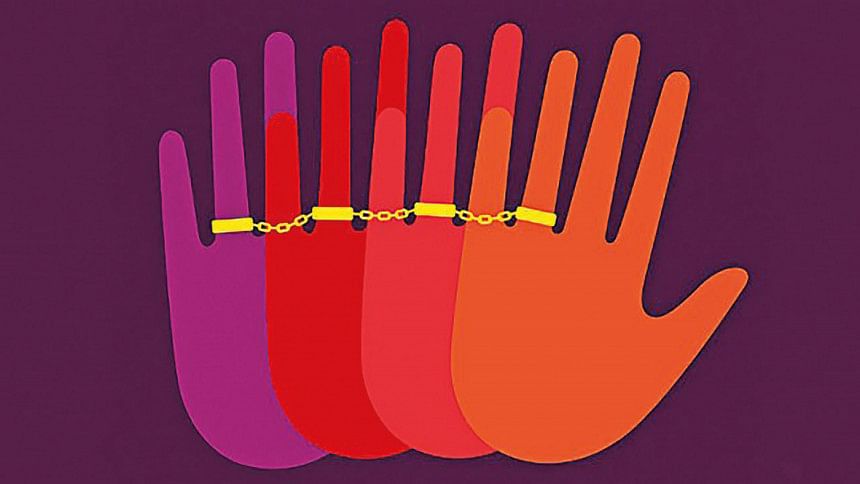Polygamy: Enabling Law and its analysis in Bangladesh Perspective

Polygamy implies the practice of getting married to more than one spouse at the same time. As per paragraph 255 of Mulla's Principles of Mahomedan Law, a Mahomedan may have as many as four wives at the same time but not more (Baillie, 30, 154 (fourth class). It is admitted that the above interpretation originated from the Holy Quran (An-Nisa" 3rd verse of the fourth surah) where it has been proclaimed "If you fear that, you will not deal fairly with orphan girls you may marry whichever other woman seems good to you, two, three or four. If you fear that you cannot be equitable to them, then marry only one. (Quoted from the book "The Quran, translated in English by M.A.S. Abdel Haleem)
As a matter of fact, we have inherited the statutory laws on Polygamy from Pakistan (Muslim Family Laws Ordinance, 1961 and that of rules, 1961 (briefly, MFLO)). Subsequently, MFLO went through several amendments in 1974, 1982, 1985, 1987, and lastly in 1989. In section 6, the statutory rules regarding Polygamy has been provided for which laid down certain obligations and punishments that are to ensue from the contravention of such obligations.
In this piece, I would like to take the opportunity to shed light on the application of our relevant laws to dispel inquisitiveness in that regard. By the same token, I shall also discuss on whether the law safeguards the right of the existing wife/wives from being exploited by their husband in the name of polygamy and paradoxically, whether a Muslim husband is debarred from exercising his right bestowed upon him by the Quran on account of section 6 in MFLO.
There has been a general perception among the commoners that a husband should only take permission from his existing wife/wives while taking another wife. It is partially true in the sense that while seeking permission to the Arbitration Council (shortly, AC) husband has to affirm that he obtained consent from his existing wife/wives. Obviously, a husband has to furnish two basic information to AC, one entailing the reason for the proposed marriage and another, asserting the obtention of consent of the existing wife/wives. Here the question of partiality of the AC may surface. Though the AC consists of three members, the Chairman plays a pivotal role in granting permission. However, the Chairman while granting or refusing permission, has to record his/her reasons. Still, the decision to be pronounced by the AC is not a conclusive one and the same is amenable to revision by an Assistant Judge inasmuch as any party aggrieved with the decision of the AC can apply for revision within 30 days and the decision of the Assistant Judge shall be final. Now, a question may arise as to how the decision of an Assistant Judge can be made final rendering the aggrieved party virtually without any remedy. The simple answer to that question is that upon exhausting such statutory remedy, the constitutional remedy will then open to the aggrieved party who can then resort to the writ jurisdiction of the High Court Division under article 102(2) of our Constitution. Even then, some may vent their displeasure saying that why the legislature at the first instance bestowed authority upon a Chairman over a judicial officer. In my view, the legislature might have thought of the social setup of the village people, their socio-economic condition vis-a-vis mobility of the majority of people in the country. On top of that, a Chairman being an elected public representative in the lowest tier of local government is more accessible to the people of his/her locality and privy to their wellbeing enabling him to reach the decision.
That being said, the legislature has also very consciously conferred revisional jurisdiction upon an Assistant Judge to examine the legality and veracity of the decision passed by a Chairman and then implicitly to the High Court division. Given the above scenario, it appears that there has been no shortcomings as such in the formation of AC. Now, let me focus on the consequence a husband may face for the contravention of the law. A husband will have to face two different sorts of eventualities, firstly, he has to pay back the entire amount of dower whether prompt or deferred to the existing wife/wives, failing which the amount shall be recoverable through certificate proceedings, and secondly, the existing wife/wives can lodge Complaint Register (CR) case before the competent court of Metropolitan Magistrate or Judicial Magistrate under section 190(1) of the Code of Criminal Procedure (CrPC). In the event of contravention, the husband can be penalised with a one-year simple imprisonment or with a fine that may extend to taka ten thousand or with both. An existing wife/wives can choose both the recourses even while keeping her/their marriage existing.
In our prevailing social setup with some exceptions, a married woman particularly a village woman tends to be reluctant to go for any legal action against her existing husband foreseeing her financial vulnerability, fear of getting a divorce, social stigma.
Another legal point that may come up in this respect and which did not find a place in section 6 of MFLO is the question as to whether a wife has to initiate criminal proceedings on her own. The obvious answer is "no", as section 190(1) (c) of CrPC empowers a competent magistrate to take cognisance of the offense upon gathering information from "any person" having knowledge of the commission of the offense. All in all, with the cumulative discussion, it has been deduced that there have been no loopholes in section 6 of MFLO in terms of getting proper remedy by an existing wife/wives. More often than not, in our society, women are not well-aware about exercising their rights. In such a panorama, non–government organisations, different civil society platforms, and rights organisations can sensitise women regarding their legal rights. Even though in our country polygamy is legal, our society does not look at polygamy in a positive manner. Earlier, our literacy rate was not that satisfactory and people were not aware of the law and did not bother about birth control, the reproductive health vis-a-vis polygamy was prevalent mostly in the rural areas; however, over time, with the advent of modern technology and tremendous enhancement of literacy rate, people have become more conscious in terms of their family planning, financial stability, upbringing of their offspring as worthy citizens which have eventually dwindled the polygamous marriages.
Clearly, a Muslim husband can exercise his right of polygamy if there are legitimate reasons. However, there is no scope to assume that legal provisions of polygamy have given unfettered authority to a Muslim husband to contract marriages at his own sweet will. Rather, section 6 of MFLO has set out some stringent conditions and if properly implemented, it may be regarded as one of the best pieces of legislation. Literally, certain checks and balances have been imposed in case of polygamy so that the husband could not exercise authoritative disposition over his existing wife/wives. It is widely viewed that, for certain compelling humanitarian reasons polygamy had been permitted in Islam and since such necessity is not prevalent in our modern society, it should be abrogated. But such a view may not be well-founded when our holy Quran bestowed it upon Muslims and section 6 of MFLO is still in vogue.
In this context reference may be given in the case of Mohammad Illius v. Jesmin Sultana reported in 19 BLD (AD) 122. In that verdict, our apex court flatly dismissed the observation made by the High Court Division recommending the deletion of section 6 from MFLO while adjudicating a civil revision. It will not be out of place to note that it was found to be extraneous in making such recommendation as the matter stemmed from a family suit for dower and maintenance filed by the wife against her husband (17BLD 4). Invariably, we are now constitutionally bound to follow section 6 of MFLO strictly as the same has been solidified by the decision of the Appellate Division.
It is a common perception, in patriarchal values, that polygamy is a weapon that handed a husband towering authority to subdue a woman allowing him to marry as many times as he desires to deny equal honour, dignity, fair treatment among the wives leaving them to lead substandard life. But the above notion is relative, as a human disposition cannot be guided by enacting law. With the foregoing discussion it is now abundantly clear that section 6 of MFLO has been incorporated in MFLO only to bring polygamy into the legal framework and to make polygamous marriages congenial, productive, and effective. If the provisions set forth above are adhered to, particularly by the husbands, polygamy will not remain as a debated issue for the society.
The writer is a Justice at the High Court Division, Supreme Court of Bangladesh.

 For all latest news, follow The Daily Star's Google News channel.
For all latest news, follow The Daily Star's Google News channel. 



Comments